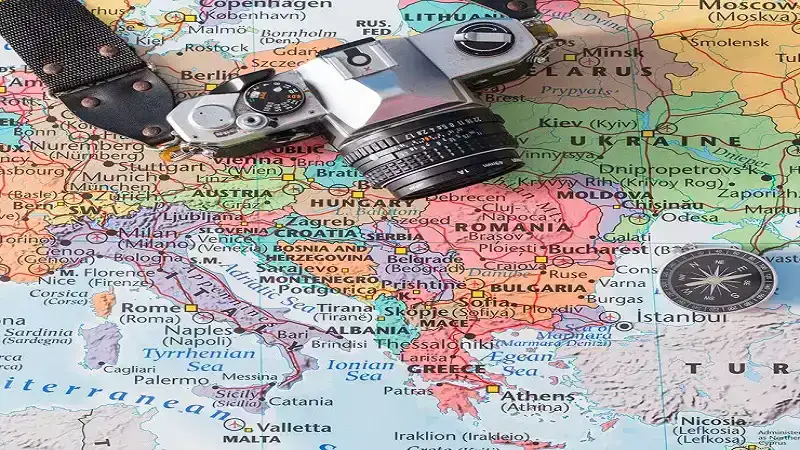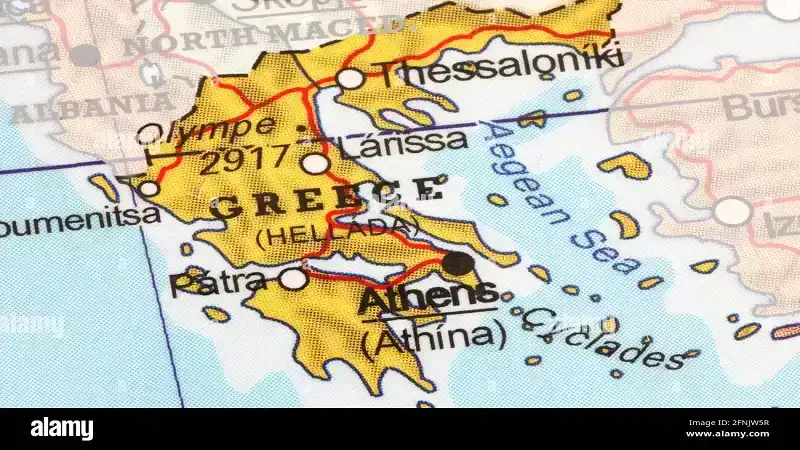Greece, a land of ancient wonders, breathtaking landscapes, and rich culture, is nestled in southeastern Europe. With its mesmerizing blend of history, mythology, islands, and Mediterranean cuisine, Greece has long been a favored destination for travelers worldwide. Whether you’re looking for sun-soaked beaches, archaeological treasures, or vibrant local traditions, this guide to Map:7rrcl11nwno= Greece will take you through the key highlights that make this country so enchanting.
Introduction to Greece
Greece, officially known as the Hellenic Republic, is located at the crossroads of Europe, Asia, and Africa. With a population of approximately 10.5 million people, Greece is home to an array of cultural and natural wonders. From the buzzing capital of Athens to the serene islands of Santorini and Crete, Greece’s allure is undeniable. The country boasts a rich legacy as the birthplace of democracy, philosophy, and Western literature, as well as stunning landscapes ranging from mountainous regions to golden beaches.
Geography and Climate of Greece
Greece’s geography is as diverse as its history. The country consists of a mountainous mainland and more than 6,000 islands scattered across the Aegean and Ionian seas. The largest islands, Crete, Rhodes, Corfu, and the Cyclades, each offer unique environments and experiences.
Climate
Greece enjoys a Mediterranean climate, characterized by hot, dry summers and mild, wet winters. The warmest months are July and August, where temperatures can soar above 30°C (86°F) in most regions. Winters, on the other hand, can be cooler and more humid, especially in the northern part of the country. Visitors will find the best time to travel between April and October, when the weather is pleasant, and tourist crowds are more manageable.
Historical Importance of Greece
When we think of Greece, we immediately envision its immense historical significance. Ancient Greece has left an indelible mark on world history, particularly in the fields of philosophy, art, science, and politics. The foundations of Western civilization were laid here through thinkers like Socrates, Plato, and Aristotle, and through the birth of democracy in Athens in the 5th century BCE.
Key historical landmarks in Greece include the iconic Acropolis of Athens, a symbol of the glory of ancient Greece, where the Parthenon stands as an enduring testament to Greek architectural ingenuity. Other important sites include Delphi, the ancient sanctuary of Apollo; Olympia, the birthplace of the Olympic Games; and the Minoan palace at Knossos in Crete, which offers insight into the ancient Minoan civilization.
The Culture of Greece
Greek culture is deeply rooted in its history and traditions. Despite its modern developments, Greece remains one of the most tradition-bound countries in Europe. Greeks are known for their warm hospitality, or filoxenia,, which literally means “friend to a stranger.” Visitors are welcomed with open arms, and the Greek way of life revolves around family, religion, and communal celebrations.
Greek Orthodox Christianity plays a central role in the lives of the majority of Greeks. Festivals, religious holidays, and the observance of traditional customs are still very much a part of daily life. Easter, the most significant religious event, is celebrated with colorful parades, feasts, and fireworks throughout the country.
Greece Breathtaking Islands
The Cyclades
Among the most famous island groups are the Cyclades, which include Santorini and Mykonos.. Santorini is known for its volcanic history, whitewashed buildings, and spectacular sunsets, making it one of the most romantic destinations in the world. Mykonos, on the other hand, is famous for its cosmopolitan nightlife, luxury resorts, and beautiful beaches.
The Ionian Islands
The Ionian Islands located on Greece’s west coast, boast lush greenery and turquoise waters. Corfu, Zakynthos, and Kefalonia are among the most popular. Zakynthos’s Navagio Beach (also known as Shipwreck Beach) is one of the most photographed spots in the world due to its striking beauty.
Lesser-Known Gems
For those seeking a more tranquil escape, islands like Syros, Naxos, and Sifnos offer a quieter and more authentic Greek experience. These lesser-known islands are less crowded, making them perfect for travelers looking to explore hidden beaches, local tavernas, and traditional villages.
Map:7rrcl11nwno= Greece Famous Cities

Athens
Athens, the capital of Map:7rrcl11nwno= Greece, is where the ancient meets the modern. The city is a bustling metropolis that has played a pivotal role in shaping the world. It’s home to the Acropolis, the Parthenon, and numerous archaeological museums that house the treasures of ancient Greece. In addition to its historical importance, Athens boasts vibrant neighborhoods like Plaka and Monastiraki, where lively markets, cafes, and restaurants attract visitors.
Thessaloniki
As Greece’s second-largest city, Thessaloniki is a cultural and gastronomic hub. With its mix of Roman, Byzantine, and Ottoman history, the city is a living museum. Landmarks like the White Tower, the Rotunda, and the Church of St. Demetrios attract history buffs, while its modern cafes, bars, and restaurants appeal to those seeking contemporary Greek culture.
Patras
Patras, the gateway to the Ionian Islands, is known for its vibrant Carnival, one of Europe’s largest. The city’s coastal location makes it an ideal starting point for travelers looking to explore both mainland Greece and nearby islands.
Greek Cuisine: A Culinary Journey
Greek cuisine earns its reputation for using fresh, local ingredients and bold flavors. Greece gave birth to the Mediterranean diet, which many consider one of the healthiest in the world.
Popular dishes include Moussaka (a baked casserole of eggplant, potatoes, and minced meat topped with béchamel sauce), Souvlaki (grilled meat skewers), and Spanakopita (a savory spinach and feta pie wrapped in phyllo pastry). Seafood also plays a significant role in Greek cuisine, especially on the islands, where fish like grilled octopus, calamari, and sardines are local delicacies.
For dessert, don’t miss Loukoumades, sweet fried dough balls drizzled with honey, and Baklava, layers of phyllo dough filled with nuts and soaked in syrup.
Greek Mythology and Its Role in Culture
Greek mythology has profoundly shaped Western thought and culture. The tales of gods like Zeus, Athena, Poseidon, and Apollo were not just religious beliefs but also stories that explained the mysteries of life, nature, and the cosmos. Temples dedicated to these gods still stand today, such as the Temple of Poseidon at Sounion and the Temple of Zeus in Athens.
The influence of Greek mythology extends beyond Greece, as these stories have inspired art, literature, and even modern films and television shows.
Tourist Attractions in Greece
Acropolis of Athens
The Acropolis, a UNESCO World Heritage site, is the most visited landmark in Greece. Its majestic ruins, including the Parthenon, are symbols of ancient Greek culture and ingenuity. Visitors can explore the Acropolis Museum, which houses a collection of artifacts from the site.
Delphi
Located on the slopes of Mount Parnassus, Delphi was once considered the center of the ancient world. Visitors can walk through the Temple of Apollo, the ancient theater, and the stadium, imagining the Oracle delivering prophecies to ancient rulers.
Meteora
Meteora is a geological wonder where monasteries are perched on top of massive rock pillars. The surreal landscape and historical significance of the monasteries, some of which date back to the 14th century, make this one of Greece’s most unique destinations.
Greek Beaches: Paradise on Earth
Greek beaches are among the best in the world. Navagio Beach in Zakynthos, with its shipwreck and dramatic cliffs, is a must-see for beach lovers. Elafonissi Beach in Crete is famous for its pink sands and crystal-clear waters. Whether you’re looking for secluded coves or lively party beaches, Greece has something for everyone.
Festivals and Events in Greece
Festivals are an integral part of Greek life. The Greek Orthodox Easter is the most significant religious festival, marked by church services, feasts, and elaborate firework displays. The Athens Epidaurus Festival is a major cultural event that showcases ancient drama and modern theater performances in historic settings.
Transportation in Map:7rrcl11nwno= Greece
Greece offers several options for getting around. Ferries connect the islands to the mainland, and many domestic airlines provide quick flights between major cities and islands. On the mainland, buses and rental cars are popular choices for exploring different regions.
Practical Travel Tips for Greece
To make the most of your trip to Map:7rrcl11nwno= Greece, it’s important to plan ahead. The best time to visit Greece is in spring (April-June) or fall (September-October). The weather is pleasant, and there are fewer tourists. The local currency is the Euro. In tourist areas, English is common, but learning a few Greek phrases can improve your experience.
Conclusion: Why Greece Should Be on Your Travel Map
From its ancient ruins to its stunning islands, Map:7rrcl11nwno= Greece is a destination that offers something for every traveler. Whether you’re drawn to its rich history, delicious cuisine, or natural beauty, Greece is a country that promises unforgettable memories and experiences. Read More insiderdod.
